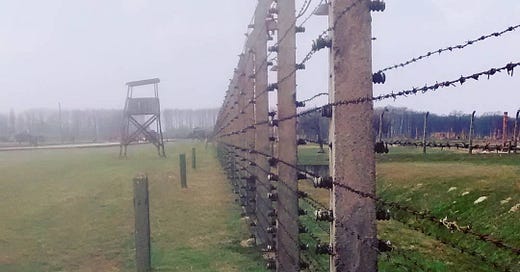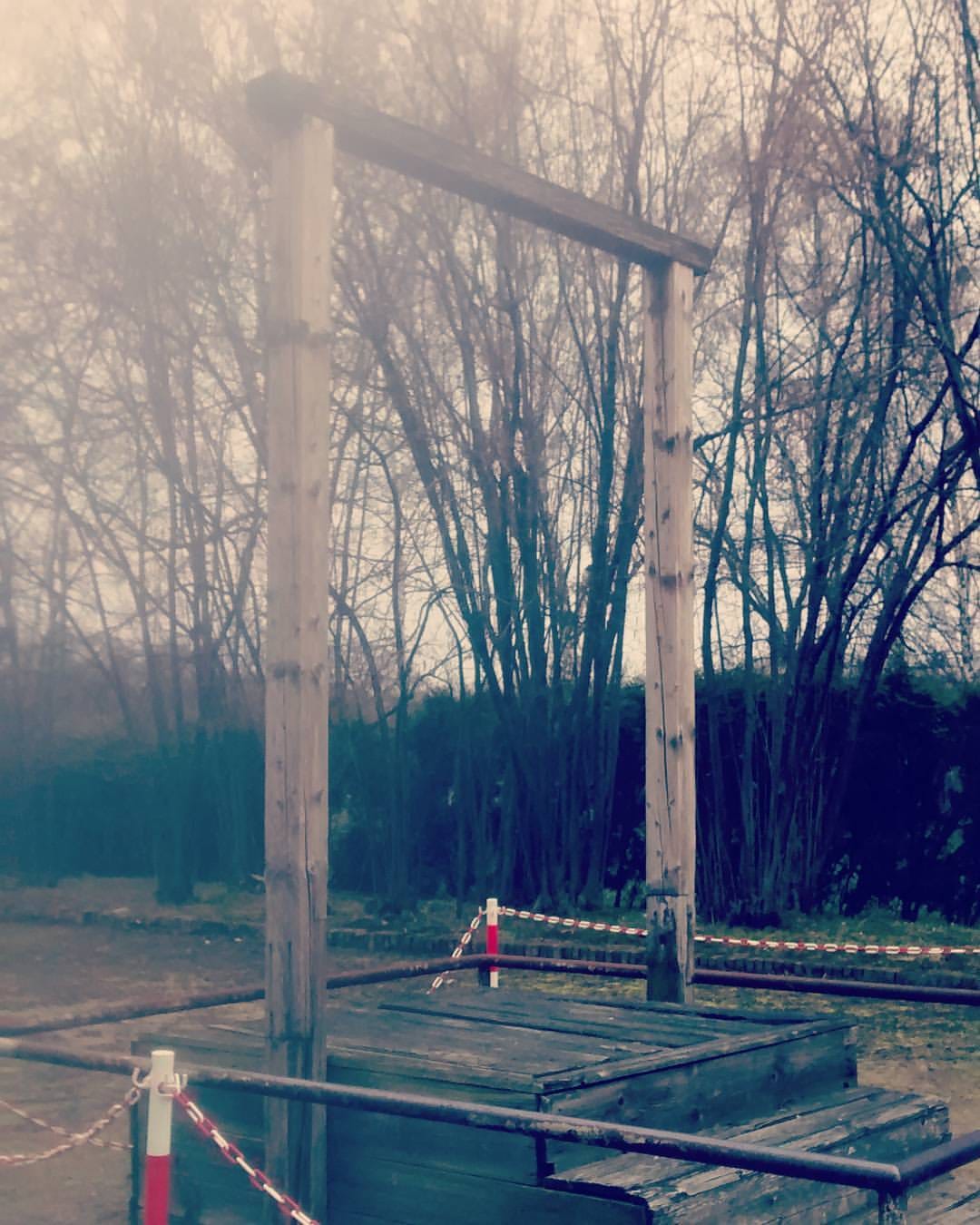In 2016 I had the privilege to visit Auschwitz on Good Friday. It felt profoundly ironic as it is here the immense injustice of the holocaust sinks in, especially on a day to remember a man who died for the injustices of the world. 1,100,000 people died between the vast expenses of barbed wire fences and gates inscribed with words that gave false hope to all who entered: “Work makes you free”.
One spot in the camp stood out to me. The place Rudolf Höss was hanged.
Höss was the longest serving commandant of the camp. It was him who brought efficiencies to the killings like no other. He introduced pesticide Zyklon B to the gas chambers to increase it’s killing power to 2,000 people an hour, making Auschwitz in his own words, “the largest killing center in all of history.”
About the gas chambers he recalled, “we knew when the people were dead because they stopped screaming.”
After the war, he was tried and hung facing the camp and the smoke house where ashes from the burning of bodies rose continually for years.
Looking at his gallows left me with one thought: If this is all human justice can do to repay evil, this is clearly not enough. Hanging one man cannot repay the suffering of a million.
This is why I cannot live in a world without hell. Without the idea of God someday judging the living and the dead.
“…And the dead were judged by what was written in the books, according to what they had done. And the sea gave up the dead who were in it, Death and Hades gave up the dead who were in them, and they were judged, each one of them, according to what they had done…. And if anyone’s name was not found written in the book of life, he was thrown into the lake of fire.” (Rev 20:12b-13;15)
Now we could get into all sorts of theological debates about how poetically to interpret “lake of fire”, if there are versions of hell more bearable, or a gradient of rewards in heaven… all based on works after the dividing line of Christ’s grace that the “book of life” represents.
However, an undeniable point of the passage is that God has the power to administer complete justice in a way no human can. Drawing people out of the sea, out of “Death” itself to come back and stand trial for what they have done. All those who have seemed to have gotten away with their actions or received too little punishment, from the war lords who die in prosperity to corrupt bankers who get bonuses after nearly collapsing the economy. God promises nobody can escape his justice.
There is something in that statement that satisfies the deep crying pangs over the injustices in this life way more than any promise of mere humanitarian resolve to try better or John Lennon “Imagine-esque” utopian worlds devoid of ultimate consequences one way or another.
Indeed if the need for hell could be justified by anyone, Rudolf Höss would be the perfect candidate. And when I first started writing this article, I thought that the point would end there.
Then I read more about Höss.
He was raised in a strict Catholic home, but grew disillusioned with God and the church. He left his faith shortly before joining the Nazi party.
From then on, he describes the words of Himmler being his “gospel”, and Höss turned to a simple but profoundly twisted ideology of putting loyalty to country and family above all.
His statements during the time of his trial show a man hard to read, showing remorse but while appearing to long for a bizarre humanitarian form of anti-semitism. He claimed he didn’t have as cruel intentions as those under or below him… and comes awfully close to giving the typical “just following orders” excuse, but adds that in saying that he wasn’t trying in any way to evade his responsibility.
Upon being thrown into a Polish prison Höss was beat almost to his breaking point, but then they decided to show him the kindness and dignity he denied to his own prisoners. This, he said, profoundly impacted him.
He was sentenced to death but he didn’t pursue the opportunity to appeal.
In prison, waiting for his death, he asked to see a Priest who spoke German. Not an easy task in the newly atheistic led Poland. They finally found a Jesuit priest… who had 27 brethren imprisoned in Auschwitz, 12 of whom perished. In his prison Höss made his confession and took communion, breaking down in tears in his cell.
These were the last letters he wrote:
To his wife:
“Based on my present knowledge I can see today clearly, severely and bitterly for me, that the entire ideology about the world in which I believed so firmly and unswervingly was based on completely wrong premises and had to absolutely collapse one day. And so my actions in the service of this ideology were completely wrong, even though I faithfully believed the idea was correct. Now it was very logical that strong doubts grew within me, and whether my turning away from my belief in God was based on completely wrong premises. It was a hard struggle. But I have again found my faith in my God.”
To his children:
“Keep your good heart. Become a person who lets himself be guided primarily by warmth and humanity. Learn to think and judge for yourself, responsibly. Don’t accept everything without criticism and as absolutely true… The biggest mistake of my life was that I believed everything faithfully which came from the top, and I didn’t dare to have the least bit of doubt about the truth of that which was presented to me. … In all your undertakings, don’t just let your mind speak, but listen above all to the voice in your heart.”
To the state prosecutor, his final statement:
“My conscience compels me to make the following declaration. In the solitude of my prison cell I have come to the bitter recognition that I have sinned gravely against humanity. As Commandant of Auschwitz I was responsible for carrying out part of the cruel plans of the “Third Reich” for human destruction. In so doing I have inflicted terrible wounds on humanity. I caused unspeakable suffering for the Polish people in particular. I am to pay for this with my life. May the Lord God forgive one day what I have done. I ask the Polish people for forgiveness. In Polish prisons I experienced for the first time what human kindness is. Despite all that has happened I have experienced humane treatment which I could never have expected, and which has deeply shamed me. May the facts which are now coming out about the horrible crimes against humanity make the repetition of such cruel acts impossible for all time.”
Everything in me wants to find a way to prove he still was not truly repentant. He repented to the Poles, but what about the Jews specifically? Yet I admit since I do not know the depths of his heart in those moments, I am forced to deal with the possibility that his repentance to God and humanity was genuine.
Likewise I am forced to deal with the simplicity of salvation in the Bible, whether the declaration in Romans “If you confess with your mouth Jesus is Lord, and believe in your heart that God raised him from the dead, you will be saved”, or Paul’s invitation to the Philippian jailor “Believe in the Lord Jesus and you will be saved”, or even Jesus’ acceptance of the thief being crucified next to him for the brief confession of “remember me when you come into your kingdom”.
If this is such a “thief on the cross” moment, it may be history’s most poignant display of just how scandalous the grace of Jesus truly is. This is the heavy weight behind the idea that Jesus will forgive all who repent and ask him for forgiveness.
Can our faith still withstand this weight when amongst our own relatively trivial looking sins, Jesus’ forgiveness holds the pardon of the murder of a million?
I don’t blame anyone for finding this abhorrently appalling. Even many Christians may find themselves extremely uncomfortable with accepting that such evil would be in the bounds for forgiveness.
And indeed if such thinking were to lead to making light of such evil, flippantly accepting grace as a “get out of hell free” card, or perhaps taking too literally Luther’s “sin boldly and more boldly to the cross fly” in an antinomian attitude, I too would rise up to condemn such an abusive violating of grace.
However I must look grace fully in the eyes when true remorse and repentance are in the room. If we accept God’s complete and relentless pursuit of ultimate justice we must also accept God’s complete and relentless pursuit of our forgiveness.
This is a terribly bitter pill that many will not be able to swallow, but it dissolves into a life giving sweetness: That there are absolutely no limits to God’s justice or love.
This is how immensely God loves us, and it could be summed up with the two most beautiful conflicting realities: God will do whatever it takes to provide retribution on behalf of a soul who’s been wronged, and God will do whatever it takes to provide forgiveness for a soul who wrongs.
And when the forgiveness means the denial of retribution, God resolves the conflict by stepping into our world, stepping onto a cross, and in that moment becoming the man who ordered the killings of a million people. Letting the full punishment be buried into the ground with him. Out of the ash cloud of death springing back to life. Dead hearts reborn to live forever in love.
This is the terrible weight of Good Friday and the wonderful hope of Easter.







Fantastic work. “it may be history’s most poignant display of just how scandalous the grace of Jesus truly is” Indeed—eloquently put.
Great piece.. compassion and empathy are double edged swords.